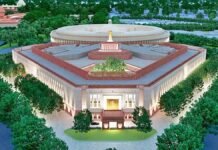
Key Points:
- Bill Passed: The Waqf Amendment Bill 2024 was passed by both houses of Parliament with majority votes and now awaits presidential assent.
- Nationwide Protests: Massive protests erupted in cities like Kolkata, Ahmedabad, Chennai, and Ranchi after Friday prayers, with demonstrators demanding the bill’s withdrawal.
- Controversial Amendments: The bill introduces significant changes to Waqf property management, sparking concerns over minority rights and government overreach.
- Arrests in Ahmedabad: Police detained 50 protesters in Ahmedabad as tensions escalated during demonstrations.
New Delhi: The Waqf Amendment Bill 2024 was passed by the Lok Sabha on Wednesday and the Rajya Sabha on Thursday, despite fierce opposition from several political parties and minority groups. The bill introduces sweeping changes to the management of Waqf properties, including:
- Shifting decision-making power on disputed properties from Waqf Boards to District Collectors.
- Removing the concept of “Waqf by use,” ensuring only officially declared properties are recognized as Waqf land.
- Allowing non-Muslims to be appointed to Waqf Boards and Tribunals.
- Centralizing the registration process for Waqf properties.
Prime Minister Narendra Modi described the bill as a “turning point” aimed at enhancing transparency and accountability in managing Waqf properties. However, critics argue that it undermines minority rights and dilutes the autonomy of Waqf Boards.
Protests Erupt Across India
The passage of the bill has triggered widespread protests across the country. Thousands of members of the Muslim community took to the streets after Friday prayers in cities like Kolkata, Ahmedabad, Chennai, and Ranchi. Protesters carried banners with slogans such as “Reject Waqf Bill” and “Waqf Bill Wapas Karo,” demanding its immediate withdrawal.
Key Protest Highlights:
- Kolkata: Large crowds gathered at Park Circus Crossing, waving national flags and holding placards. The Joint Forum for Waqf Protection coordinated many of these demonstrations.
- Ahmedabad: Protests turned tense as police detained 50 demonstrators. Visuals showed elderly protestors being forcibly removed from roads.
- Chennai: Actor-politician Vijay’s Tamilaga Vettri Kazhagam led statewide protests, with gatherings in Coimbatore and Tiruchirappalli. Vijay called the bill “anti-democratic” and a threat to India’s secular principles.
- Ranchi: Protesters assembled outside Akra Mosque with banners opposing the bill, describing it as an attack on their rights.
Opposition Voices Concerns
Opposition leaders have strongly criticized the bill. Congress leader Mallikarjun Kharge pointed out that while 288 MPs supported it in the Lok Sabha, 232 opposed it a clear indication of dissent. Critics argue that:
- The amendments disproportionately affect minority rights.
- Shifting decision-making to government-appointed officials could lead to misuse.
- The removal of “Waqf by use” could strip communities of historically significant properties.
The All India Muslim Personal Law Board (AIMPLB) has vowed to challenge the legislation in court, labeling it a “black law” that threatens minority rights.
Government’s Justification
The government defends the amendments as necessary reforms to curb alleged misuse of Waqf laws. Officials claim that previous provisions allowed private properties to be wrongfully declared as Waqf land, leading to legal disputes and unrest. By introducing centralized registration and oversight mechanisms, the government aims to streamline governance and ensure transparency.
Tensions Mount Amid Political Implications
The protests have added fuel to political tensions ahead of upcoming elections in states like West Bengal and Tamil Nadu. West Bengal Chief Minister Mamata Banerjee has pledged not to let her state’s Muslim population lose their lands under this bill. She accused the ruling BJP of attempting to divide communities for political gain.
Meanwhile, Tamil Nadu saw actor Vijay emerge as a vocal critic of the legislation, potentially positioning himself as a key player in next year’s assembly elections.
The Waqf Amendment Bill 2024 has ignited a nationwide debate over its implications for minority rights and property governance. While the government touts it as a move toward transparency, widespread protests reflect deep-seated concerns among affected communities. As tensions rise, all eyes are on how this contentious legislation will unfold in courts and on political battlegrounds across India.















































